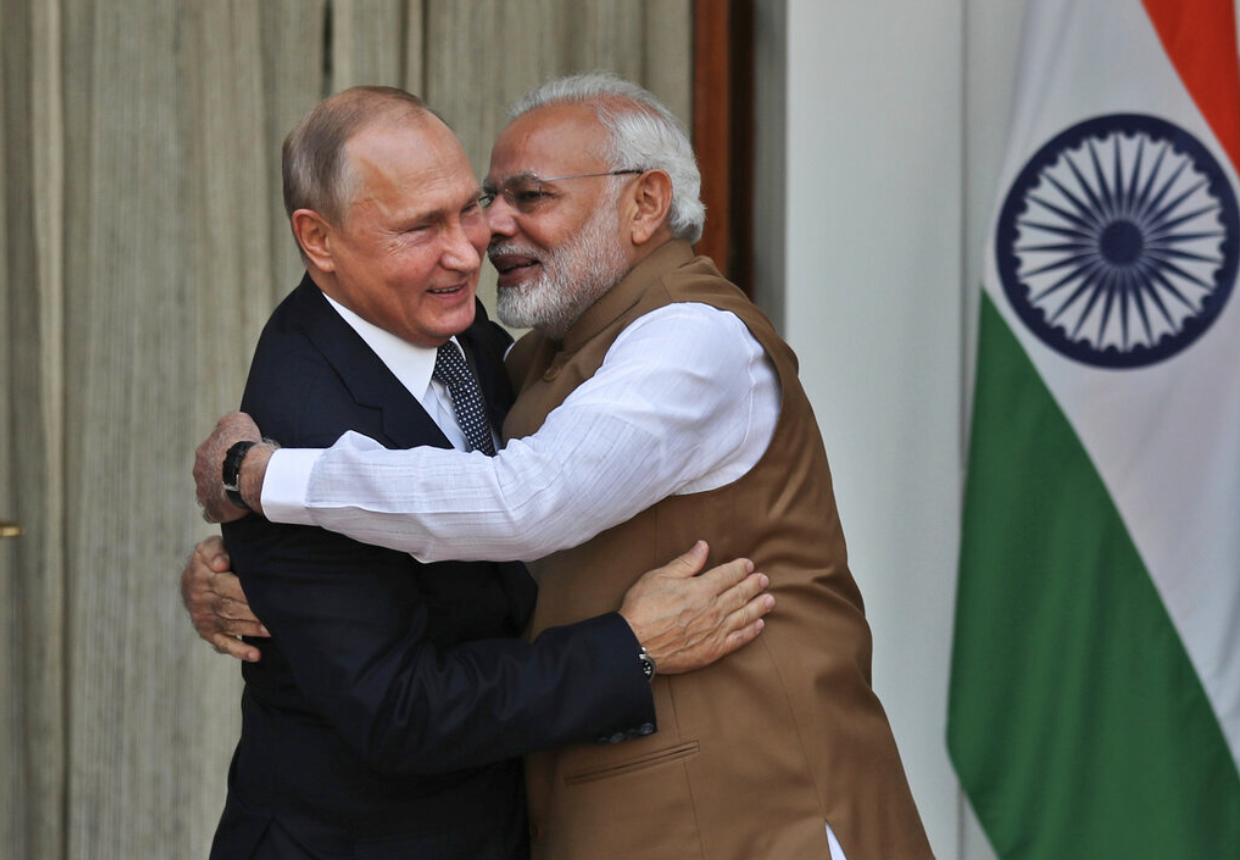India Edges Closer to Condemnation in Ukraine
Indian Prime Minister Narendra Modi and Russian President Vladimir Putin hug before their meeting on Oct. 5, 2018, in New Delhi, India. Photo: AP Photo/Manish Swarup
An explosion rocked the strait separating Crimea from Russia on Oct. 8– the main highway connecting the two regions had been bombed. Russia reported three casualties from the attack. Two days later on Oct. 10, Russia retaliated with a massive barrage of between 70 and 86 cruise missiles aimed at targets across Ukraine, including civilian infrastructure targets. At least 19 civilians were killed, over 100 were wounded, and power to hundreds of hamlets and towns was temporarily knocked out.
Following the two attacks, India’s spokesperson of the External Affairs Ministry, Arindam Bagchi, published a statement the next day addressing the situation: “India is deeply concerned at the escalation of the conflict in Ukraine, including targeting of infrastructure and deaths of civilians,” and without specifying to whom specifically the address was directed towards he continued, “We urge immediate cessation of hostilities and urgent return to the path of diplomacy and dialogue”.
On the surface, this is a rather vapid response: no condemnation, no singling out, no specific calls to action or inaction, no direct support given to either side, and no direct offers of mediation. But delving deeper into the semantics of the statement reveals that India’s stance on Ukraine and Russia has changed markedly since February.
Up to this point, India has wished to play the role of the great neutral with the war in Ukraine. India has long had significant military aid from Russia. Both countries share a friendship over aspirations of shared influence in Central Asia and would like to hold on to that partnership. India has shown this desire consistently throughout the conflict both at home and abroad.
In India, local media coverage of Ukraine has been tepid at best, rarely making national news circuits. When the war has been talked about, the subject has mostly been about the some 20,000 Indian national students in Ukraine at the beginning of hostilities and their subsequent retrieval. In the initial response to the conflict in February, India was one of only three nations to abstain from the vote of the UN Security Council demanding immediate cessation of hostilities and the withdrawal of Russian forces, along with the UAE and China. Importantly, India has never publicly placed blame directly on Russia or openly accused the Russian government of commiting international crimes or war crimes like much of the international democratic community has.
Flames and smoke rising from the Crimea Bridge connecting Crimea to Russia following a Ukrainian truck bombing on Oct. 8. AP Photo/Uncredited
With this in mind, Bagchi’s statement is notable for its relative directness towards Russia. The message shows that, as a democratic nation, it is becoming more and more difficult to stay silent. Attacks on civilians, phony elections, and violations of sovereignty against the will of the international community place India in the precarious position of not upholding the values of democracy.
Moreover, Russia is realistically becoming less of an asset to India. Facing logistical problems of its own in Ukraine also means that supplying arms to India, a staple of Russo-Indian friendship, becomes less possible with each passing day. In fact, Russia has the potential to morph into a liability for India because of this.
Russia is also moving closer to China, hindering the Russo-Indian partnership each day. China and Russia have grown closer since February and have maintained rigorous trade in spite of the war. Xi Jingping has met with Vladimir Putin pledging to jointly “play [leading roles] in injecting stability into a world of change and disorder” and increase “cooperation in trade, agriculture, connectivity”.
Accounting for Chinese-Indian relations since the 1962 Sino-Indian War and Russia’s growing inability to support India with military equipment because of Ukraine, Russia’s growing proximate relations with China is a liability to India as well.
India has not given up on its friendship with Russia. However, a public statement directed towards Russia condemning Russian attacks is a significant indication of the strain the war in Ukraine is placing on Russo-Indian relations. Not only does Bagchi’s statement show a gradual, glacial, shift in public opinion, it shows that government officials are not unanimous in their support for public neutrality.


